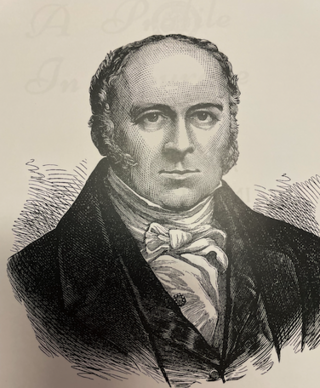Related Research Articles

The Non-subscribing Presbyterian Church of Ireland is a non-creedal Christian denomination, which maintains a great emphasis on individual conscience in matters of Christian faith.

John Abernethy was an Irish Presbyterian minister and church leader, the grandfather of the surgeon John Abernethy.

Henry Cooke (1788–1868) was an Irish Presbyterian minister, an opponent of secularisation, and, in response to Catholic mobilisation under Daniel O'Connell, an advocate of "Protestant unity".
The Old Side–New Side controversy occurred within the Presbyterian Church in Colonial America and was part of the wider theological controversy surrounding the First Great Awakening. The Old and New Side Presbyterians existed as separate churches from 1741 until 1758. The name of Old Side–New Side is usually meant as specifically referring to the Presbyterian Church. When one is referring to the debate as a whole, Old and New Light is usually used.

The Reformed Presbyterian Church of Ireland is a Presbyterian church in Ireland. The church currently has forty-three congregations, of which thirty-five are located in Northern Ireland; the remaining eight are located in the Republic of Ireland. As of 2011, its total communicant membership is 1,952. The distribution of Reformed Presbyterians accords with the distribution of the Ulster Scots, with most congregations based in counties Antrim, Londonderry and Down. Several new congregations have, however, been formed recently in the Belfast area, along with fellowships in Galway and Dublin.
James Duchal, D.D. (1697–1761) was an Irish Presbyterian divine.

The Presbyterian Church in Ireland is the largest Presbyterian denomination in the Republic of Ireland, and the largest Protestant denomination in Northern Ireland. Like most Christian churches in Ireland, it is organised on an all-island basis, in both Northern Ireland and the Republic of Ireland. The church has approximately 210,000 members.
John Bankhead (1738–1833), was an Irish presbyterian minister.
Matthew Clerk, was an Irish Presbyterian minister.
Samuel Haliday or Hollyday (1685–1739) was an Irish Presbyterian non-subscribing minister, to the "first congregation" of Belfast.
The (General) Synod of Ulster was the forerunner of the General Assembly of the Presbyterian Church in Ireland. It comprised all the clergy of the church elected by their respective local presbyteries and a section of the laity. Official records of its proceedings exist from 1691.

Presbyterianism has had a presence in the United States since colonial times and has exerted an important influence over broader American religion and culture.

John Scott Porter (1801–1880) was an Irish biblical scholar and Unitarian minister.

William Dool Killen was a minister of the Presbyterian Church in Ireland and church historian.

William Bruce (1757–1841) was an Irish Presbyterian minister and educator.
Samuel Hanna (1772?–1852), Irish presbyterian divine, was born at Kellswater, near Ballymena, Co. Antrim.

The Unitarian Church in Ireland presently consists of two Congregations, Dublin and Cork, part of the Synod of Munster, in the Republic of Ireland, which has itself been part of the Non-Subscribing Presbyterian Church of Ireland since 1935. Some congregations remain closely associated with the General Assembly of Unitarian and Free Christian Churches. These churches would abide by the traditional Unitarian principles of Freedom, Reason, and Tolerance.
William Wilson was born in Glasgow, on 9 November 1690. He was the son of Gilbert Wilson, proprietor of a small estate near East Kilbride.. William Wilson's mother was Isabella, daughter of Ramsay of Shielhill. William was named after William of Orange and was educated at University of Glasgow, graduating with an M.A. in 1707. He was licensed by the Presbytery of Dunfermline on 23 September 1713 and called unanimously on 21 August 1716. He was ordained on 1 November 1716. He had a call to Rhynd, but was continued by the Presbytery in Perth. Associating with the supporters of the Marrow of Modern Divinity, he with three others Ebenezer Erskine, Alexander Moncrieff, and James Fisher laid the foundation of the Secession Church, for which they were suspended by the Commission of Assembly 9 August, and declared no longer ministers of the Church 12 November 1733. He was deposed by the Assembly 15 May 1740. He and his people erected a meeting-house, and the Associate Presbytery appointed him their Professor of Divinity, 5 November 1736, but he sank under his contentions and labours and died 8 October 1741. He is said to have combined "the excellencies of both Erskines, with excellencies peculiar to himself."

Henry Montgomery was an Irish Presbyterian minister.
John McBride was an Irish minister of the Presbyterian General Synod of Ulster and religious controversialist.
References
- ↑ The petition is dated 26 March 1718, is signed by nine presbyterian ministers and 208 members of their parishes, who declare their 'sincere and hearty inclination to transport ourselves to that very excellent and renowned Plantation, upon our obtaining from His Excellency suitable encouragement.' Thomas Witherow reprints the document, with the signatures in full, from Edward Lutwyche Parker's History of Londonderry, New Hampshire, Boston, 1851.
- . Dictionary of National Biography . London: Smith, Elder & Co. 1885–1900.
- Attribution
![]() This article incorporates text from a publication now in the public domain : "Boyd, William (d.1772)". Dictionary of National Biography . London: Smith, Elder & Co. 1885–1900.
This article incorporates text from a publication now in the public domain : "Boyd, William (d.1772)". Dictionary of National Biography . London: Smith, Elder & Co. 1885–1900.